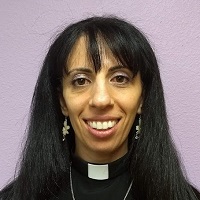Commentary on Luke 10:38-42
Mary, Martha, and their brother Lazarus are Jesus’ friends. This family opens their house to Jesus and his disciples. The Gospel of Luke 10:38-42 and John 12:1-11 are the only Gospels that narrate Jesus’ visit to this family. The evangelist John provides us with more detailed information about this visit. He mentions the three siblings: Martha serves (John 12:2), Mary anoints Jesus’ feet with perfume and wipes his feet with her hair (John 11:2; 12:3-8), and Lazarus reclines at the table with Jesus (John 12:2). The disciples are mentioned, and so is a large crowd. The evangelist Luke only focuses on Martha, Mary, and Jesus. He places this story after the parable of the Good Samaritan. This parable shocks the audience because they did not expect a Samaritan, an enemy of the Jews, to be their neighbor and succeed in what their religious leaders failed to do. Luke shocks his audience again with the story of Mary and Martha. In this narrative, Jesus welcomes Mary to learn from him.
The narrative does not intend to present Jesus as a feminist who creates a gender-egalitarian (sex-equal) society. It is not that Jesus would not be in favor of a gender-egalitarian society; rather, to attribute the term “feminist” to him would be anachronistic (chronological error) since the term would require certain actions and statements on his part that his and God’s plans would not do or say. However, he promotes a vision or even a foretaste of equality—he is saying that these women have as much to learn and teach as any man; but leaves open the logistics which would, in their time, be too difficult to digest.
To understand this pericope (passage) in Luke, we need to understand its cultural context and the early church ministry’s development in the book of Acts, mainly Acts 6—appointing the seven deacons. I will show that in the pericope of Luke 10:38-42, Jesus teaches that the ministry of service (in Greek is Diakonia) and the ministry of the word require each other.
The cultural context of the pericope relates to the practice of hospitality in first-century Palestine. In my modern-day Palestinian culture, eating together is an invitation to be a part of the family circle. It is about breaking barriers and providing protection to guests no matter the personal cost. In my culture and in first-century Palestine, hospitality is about allowing the guest to share the sacredness of the family space. The women’s role is to do all of the cooking and food preparation. It is very unusual for Palestinian women to join male guests before they are done with all the food preparation. In my culture and Jesus’, failing to be a good hostess means disrespecting the guest.
Luke’s statement that Martha opened her home to Jesus implies that Martha was an independent woman and financially stable. Martha may be a widow because there is no mention of her husband, and she owns and manages her house. If she had lived with her brother Lazarus or her husband, Luke would have said Lazarus’ house or mentioned her husband’s name. In the Middle East and first-century Palestine, the house is attributed to the family’s oldest man, not a woman. Men are always the head of the family.
Martha oversees the material care of guests. As a Palestinian Jew, Martha is anxious to ensure that her honored guest Jesus and his disciples feel welcomed at her home. Her sister Mary neglects her traditional duty of assisting her sister. Mary prefers to listen to Jesus’ teaching. It was very unusual for a first-century Palestinian Jewish woman to join men in learning. The phrase “sat at the Lord’s feet and listened” describes students’ actions. The apostle Paul states his credential in the Book of Acts, “[I] brought up in this city at the feet of Gamaliel, educated strictly according to our ancestral law, being zealous for God, just as all of you are today” (Acts 22:3). Paul’s statement indicates that Gamaliel was his teacher. Mary acts as a disciple of Jesus, who allows her to hear the word of God.
The traditional interpretation of this pericope criticizes Martha for not acting like her sister, who listens to Jesus’ teaching. We need to understand Martha’s behavior from a woman’s perspective. Martha is exhausted by the burden of hospitality that has fallen on her shoulders. She asks Jesus whether he cares that Mary left her alone to serve the guests. She asks Jesus to tell Mary to assist her. Martha’s complaint is fair. Jesus gently acknowledges Martha’s exhaustion and reminds her of her distraction. He praises Mary for choosing to listen to his teaching.
Does Jesus value Mary’s choice over Martha’s? I do not think so. The story of Jesus’ visit to Martha’s house is related to the questions of church life. Martha’s house is a house church where Christians met to worship and learn the word of God. The Book of Acts refers to house churches (2:42, 46; 5:42; 20:20). The traditional interpretation of Luke 10:38-42 presents the narrative as a problem between Martha and Mary, but it is about the two kinds of ministries: diakonia and the word. Marta represents the ministry of diakonia, and Mary represents the ministry of the word. Jesus does not prefer the ministry of the latter over diakonia. Instead, Jesus does not want the diakonia to be at the expense of the ministry of the word. Both ministries are important. The ministry of diakonia should not absorb our energy and time and drive us to neglect God’s word.
Francois Bovon explains that “Priority should be given to listening to the word of God, to taking time out, to the act of sitting down; it consists in not wishing to precede the Lord, in accepting to be served before serving.”1 The word of God motivates us to engage in the ministry of diakonia. To explain my point further, let us compare the pericope of Luke 10:38-42 with Acts 6.
The increase of disciples expands the responsibilities of the apostles. Consequently, the ministry of diakonia absorbs their time and makes them unable to serve all the widows in great need of food (6:1) and neglect the word of God. The twelve apostles state that “It is not right that we should neglect the word of God in order to wait on tables” (6:2). The disciples called seven male deacons to take responsibility for diakonia. Stephen and Philip are two of the seven deacons. Later in their ministries, they engage in the ministry of the word. Stephen testifies about his faith before the Jewish leaders (Acts 6:8-14), and Philip evangelizes the Ethiopian eunuch (Acts 8:26-40). The twelve apostles, Stephen, and Philip, demonstrate that the ministry of Diakonia must come after learning and meditating on the word of God.
It is essential to realize that the apostles and the seven deacons respond positively to Jesus’ call to ministry. Likewise, Mary positively responds to Jesus. She chooses to learn from him. It is possible that Mary engaged in the ministry of diakonia after spending time learning from Jesus. She chooses to draw near to Jesus. Jesus describes Mary’s choice as a good part that will not be taken away from her because learning God’s word always inspires believers to serve. Martha positively responds to Jesus too. She hosts him and his disciples in her home. Jesus does not ask Martha to give up the ministry of diakonia; instead, he intends to relieve Martha from her anxiety and exhaustion by inviting her to join her sister in learning from him. Then, she can resume her hospitality with her sister.
In sum, the two pericopes help us understand the development of the ministry of diakonia and the ministry of the word. In his gospel and the Book of Acts, Luke does not value one over another. The apostles in Acts 6 do not prefer the ministry of the word over the diakonia. Instead, they engage in both ministries. My denomination, the Evangelical Lutheran Church in America, calls the ministry of diakonia the ministry of word and service. The deacons study the word of God before they engage fully in service. The bottom line is: diakonia and the word of God require each other.
Notes
- Francois Bovon, et al. Luke 2: A Commentary on the Gospel of Luke 9:51-19:27. ed. Helmut Koester, Hermeneia (Minneapolis: Augsburg Fortress Publishers, 2013), 77.


July 17, 2022